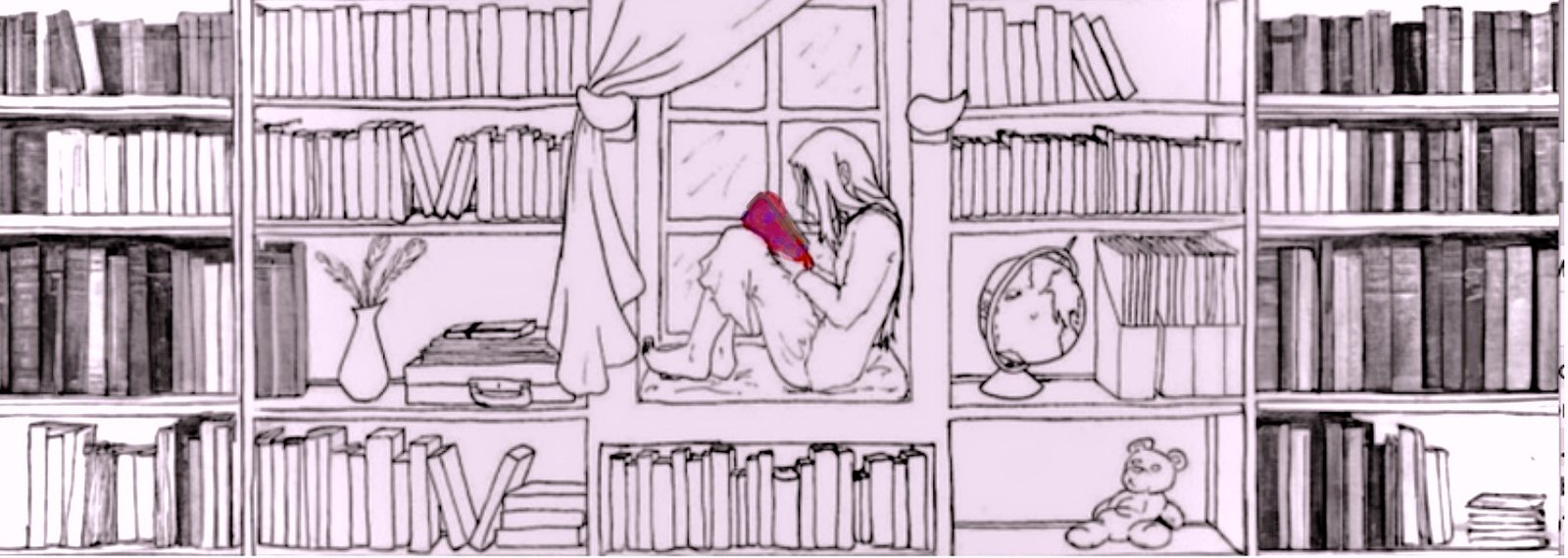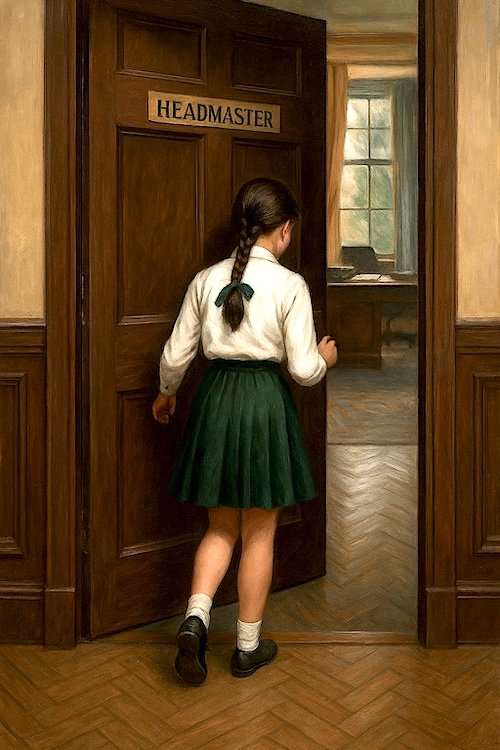1 comment(s) so far. Please add yours!
 “The MP Visits Saint Clare” continues
“The MP Visits Saint Clare” continues
Earlier instalments:
- Prologue – 11 July 1955
- Part I – 8 – 12 July 1955
- Part II – 12 July 1955 (earlier)
- Part III – 12 July 1955
Further particulars may be found in the Foreword.
This sequence draws from the Charrington Papers and the less officious corners of Saint Clare’s—those neat staff reports never meant to withstand scrutiny; the household logs written with a pointed, domestic hauteur; and the diaries, margins, and illicit notes in which the girls record rather more than their elders imagine. Some documents are respectably typed. Others arrive in the swift, unsteady cursive of someone writing under pressure, or in a place she very much oughtn’t be.
Readers are invited to take up the archivist’s task, and the investigator’s pleasure, of weighing the School’s polished accounts against the smudged, contradictory recollections of those who actually lived the day. Much will be implied. Little will be stated outright. And attentive readers may notice that Miss Gladys Williams’s file, though she left Saint Clare more than five years ago, has begun to grow again—curiously, and on no official authority whatsoever.
The archive remembers. And so, of course, does Inez.
Comments are warmly welcomed. While I enjoy seeing them on Bluesky and Twitter, those left here become part of the archive proper, where they may—quietly—shape what follows.
Saint Clare November: 26,997 / 50 000 words
Foreword – Archivist Note
 Among the curiosities preserved in the Saint Clare papers, few are as revealing—or as inadvertently scholarly—as the diary entries of Miss Anne Kelley, English Mistress. Her account of 12 July illustrates a trait well known among school staff but rarely acknowledged in print: the ability to listen with perfect composure while appearing to be engaged in productive labour.
Among the curiosities preserved in the Saint Clare papers, few are as revealing—or as inadvertently scholarly—as the diary entries of Miss Anne Kelley, English Mistress. Her account of 12 July illustrates a trait well known among school staff but rarely acknowledged in print: the ability to listen with perfect composure while appearing to be engaged in productive labour.
This instalment reproduces her notes from that afternoon, recorded with the precision of a woman trained to mark essays, spot inconsistencies, and deduce motive from grammar alone. Her vantage in the outer office afforded her a position both enviable and unenviable: she was neither participant nor bystander, but something closer to a reluctant ethnographer with unusually good access.
Readers familiar with the preceding parts (particularly the testimonies of Miss Williams) will find here a corrective of sorts. Where Gladys dealt in melodrama and sensation, Miss Kelley offers structure, sequence, and the kind of politely shaded inference that could, if one wished, form the basis of a conference paper on mid-century educational discipline.
What follows is her account: measured, attentive, and unintentionally comprehensive. It is a rare look at how a seasoned member of staff interprets a scene that most schools prefer to consign to institutional memory rather than institutional record.
From the Journal of Miss A. Kelley
12 July 1955
An extraordinary scene in the Head’s office today. I shall write it down in detail if only to convince myself it truly happened.
I was meant to be correcting essays in the outer office, though in truth I had half an ear cocked to the corridor. One learns early at Saint Clare’s that most essays will wait, but a first-class opportunity to eavesdrop will not.
Enter the Honourable Mr Gerald Charrington, M.P., with his sister-in-law Miss Gladys Williams in tow. Such was his focus and determination that, despite having overlapped with Miss Williams at Saint Clare, they barely spared me a nod. Mr Charrington greeted the Head with all the gravity of a statesman opening Parliament, and Mr Lewis, flustered but flattered, ordered a tray at once and invited them straight into his study. I sent a message to the kitchens and then pretended to busy myself marking an exercise book, though, in fact, my pen hovered uselessly over the page.
Through the door I heard the voices soon rise.
Miss G. Williams (brisk, almost defiant): It was nothing, really! Only a clipping and a note slipped along hardly a crime. Everyone acts as though it were treason. I was only trying to keep her spirits up.
Mr Charrington (dryly): Yes, that is as clear as mud, and misses the point. Explain to the Headmaster exactly what you did. Who was this note from, and to whom did you send it?
Miss Williams (defensive, quick): I only put part of Clarissa’s letter in another envelope, that was all. A harmless kindness, nothing more.
Mr Charrington (curt): Plainly, Gladys. Who was it from, and who received it?
Miss Williams (after a pause, low, reluctant): A letter from Inez to her mother.
Mr Charrington: And you sent it to—?
Miss Williams (barely audible): “To Lady de Vries.”
Mr Lewis (gave a short laugh, then catching himself, coughed): Ah, so that is how she knew. I had wondered,(clears throat hastily) “Yes, well, the School cannot condone letters carried in that fashion, Miss Williams. Still, as you are no longer under our authority—
Mr Charrington (firm, clipped): Just so. I wished only that you should hear her admit it, so the record is plain. May I request you call my daughter to this office?
Mr Lewis (hurriedly): “Of course. Though as far as the school is concerned, the matter is now closed–”
The MP cut him off at once, cold and clipped, saying the record was now plain, and that his daughter must be called.
Out bustled Mr Lewis into the outer office, where he found me industriously “marking.” He asked that I arrange for Clarissa to be sent to him. By luck Georgina Fairfax had just come in; I passed her the order, and off she flew at a clip.
No sooner had the door closed behind Fairfax (who clearly longed for more detail) than the tray arrived: cups, teapot, a plate of sandwiches clearly raided from the kitchen between meals. The maid clattered them down on “my” desk like a judge’s gavel. Hearing the raised voices, the kitchen maid shot me a pleading look. I told her I would bring the tray in.
As she left, I knocked, then turned and carried the tray to the door. The Headmaster opened it, waving me to a table where I could set the tray down. He thanked me but made no introductions, so I said, “I’ll leave you then,” and headed to the door. On my way out, I caught a glimpse of Gladys – white and rigid – before I shut the door behind me and resumed my “marking.”
And then the lull. A good fifteen minutes of it, while Fairfax hunted for Clarissa. Given the hour, there were a number of places where she could be. Fifteen minutes in which the Head attempted weather, gardens, and the coming fête as topics of conversation. Gerald answered politely enough, even took a sandwich, ate it neatly, and sipped his tea with all the composure of a man in his club. Gladys said nothing. Not a word. I pictured her, arms crossed, lips pursed, sulky as a girl ordered to sit in detention.
You see, I remember Gladys; I’ve even had occasion to read through her file.
It was all so excruciatingly awkward that I gave up even the pretense of marking and simply listened. (One can hear perfectly well through that door, even when closed, if one happens to be seated at the outer desk. I offer this in the spirit of scholarship.)
At last Gerald said, heavily: “When my daughter is brought, I should be obliged if you would permit me to speak with her privately, here, or in any other room that’s convenient.”
Mr Lewis, clearly keen to escape, leapt on the suggestion as if it were a life-raft. “Of course, of course. This is, after all, a family matter.” Hearing my greeting, he opened the door so quickly we nearly collided. Behind me was Fairfax, who had, at long last, returned with the Charrington girl in tow.
Clarissa’s, attire, white short sleeved blouse, green games skirt, her dark hair tied back with a green ribbon along with grass-stained knee socks and gym slippers, along with (I presumed) green knickers, making it plain she had been playing lacrosse and had been brought without being given a chance to change. She swept along bewilderedly, as the Headmaster hurried her into his inner office, holding the door open for her. She entered the study, giving a small gasp of dismay.
Her back alone showed her shock at the sight within: her father at tea with her aunt in the head’s office, both looking at her in stony silence. Clarissa’s father rose and greeted her, she entered, Mr Lewis then turned and briskly exited the office, not even meeting my eye. I sent the curious (I can’t blame her, I was curious too) Fairfax out of the office to resume her duties.
The door had been left a few inches ajar. For the second part of this account I could hear every word, every sound.
I will not pretend I returned to my essays. The air was alive with sound and tension. I listened as Gerald took Clarissa through her confession step by step, pressing her to admit each part. Clarissa’s voice first stumbled, then she appeared resolved to face her fault head-on, though she still refused to say for whom she had smuggled the letter, nor why she had done so. Plainly, she was refusing to drop Inez in the soup. When it finally became clear she would say no more, her father spoke sternly, saying he was disappointed that, even now, she was trying to deceive him. He then recited Gladys’s admissions himself, scolding Clarissa for drawing her aunt into the scheme.
There was a rustle, a chair moved, then a soft sound from Clarissa — half sob, half relief — telling me her father must have taken her in his arms. Apologies tumbled from her lips. His voice followed, lower and gentler than I had yet heard it that day:
“My darling girl. I have missed you sorely. You know I love you, and I always wish to be proud of you. It pains me to come here under such circumstances.”
A pause. Then, more gravely:
“But you have behaved badly and know it, and I cannot leave things as they stand. Tell me, now you have had time to think: where did you go wrong? And what should you have done instead?”
I heard Clarissa hesitate, then falter through her answer, that she ought to have obeyed the school’s rules, that she should have trusted her father with the truth, that she ought not have drawn her aunt into it. Her voice wavered, the words coming haltingly. Her father let her speak until she trailed off in an apology that expressed what sounded like sincere regret.
Then his tone changed, deepening and hardening:
“Yes, thank you. You know your fault, and you know the better path. Yet knowing is not the same as doing. You must feel it, or you will not remember. We will be dealing with this at greater length when you’re back home. Now show me you intend to behave and put yourself across my knee.”
A scrape of a chair, the pause before a storm. Then his command, clear as any schoolroom order: “Now, over my knee, young lady.”
Clarissa found her voice again. Hearing her pleas broke my heart:
“No, Papa, not here. Please don’t spank me here. Everyone will know! I’ll be home in less than two weeks — please wait!”
But he was implacable.
“And what more will you do in those two weeks? I want your disgraceful behaviour to stop now, today, and intend to ensure that it does. Hopefully your sore bottom will remind you, at least for a few days, and make you consider your actions more carefully. We will be dealing with this at greater length when you’re back home. Now show me you intend to behave and put yourself across my knee immediately. Don’t make me ask a third time.”
Clarissa made no further reply.
What followed was unmistakable, and I am not so squeamish as to pretend otherwise. A sound I know well: the steady report of palm against a knickered girl’s bottom. At first the sound was duller; then, a brief pause and a cry of “No, please,” from Clarissa.
The sharper sound of the smacks made it plain his palm was now meeting a bare bottom with what seemed increased speed and vigour. Long before four minutes passed she was undone. First crying, and then sobbing like a much younger girl. Promises of her improvement tumbled out, along with pleas for him to stop — pleas that grew increasingly desperate, until, finally, she could only sob.
Finally it ceased. Or rather, paused.
Gerald’s tone softened, coaxing, calling her his girl, telling her he was proud. Her sobbing calmed.
But then his voice hardened again, cold as verdict:
“You will give Mr Lewis no further trouble. For the two weeks left in this term, I expect to receive nothing but good reports. Have no doubt, we shall conclude this matter at home.”
There followed a final volley of smacks — clearly the hardest yet, if the sound was any measure. Then, at last, it truly stopped. I was surprised, almost caught off-guard, when I heard them, with few words, walking toward the exit.
When they emerged, she walked out first — stiff, red-eyed, hiccupping sobs — the proud correspondent I saw daily in my class replaced by a much younger, chastened child. She said her goodbyes through tears, again promising to make no further trouble. The instant the door closed behind her, she covered her face with her hands and her sobs returned. I put an arm around her, gave her a note for Matron, and told her to go straight to the infirmary, that I would be up to check on her shortly. As Clarissa turned and left the office trying hard to control her tears, I caught sight of the dark red visible below her games skirt’s hem. Clearly MP Charrington had not confined himself to her bottom, but had also reddened the tops of her thighs. This could prove embarrassing, were she seen on her way to the infirmary.
Private reflection: Generations of girls have shed tears in that study, enough to soak the carpet a dozen times over. There were smacks heard and unheard, though much more rarely across a paternal lap. These moments when parents appear to exact their own justice never appear in the official record, but are kept in the unofficial ones.
Per disciplinam et lacrimas, ad astra. Through discipline and tears, to the stars.
Young Clarissa has learnt it sooner than most. Whether her Aunt Gladys ever learnt it at all, I now very much doubt.
And now, enough of this ink-spilling. I must take up a clean sheet and write to Gwennie about the day’s events, though heaven knows how to fit them into a letter without sounding as though I’ve taken leave of my senses.
Afterword
From the Archivist
Miss Kelley’s pen now falls silent, and we turn to a pupil’s view—written from the infirmary, where Clarissa Charrington has been deposited to recover her composure. Matron, convinced cod liver oil has near-universal applications, offers it with unwavering confidence. Clarissa is equally certain it is not what is required.
The difference of opinion is instructive.
Continue to:
The MP Visits Saint Clare: Part V – Clarissa in the Infirmary


Miss Kelley’s vantage point must have afforded her the chance for quite an interesting catalog of goings on in the head’s office, even with so mild-mannered (befuddled?) a head as Mr. Lewis. I can imagine her section of the archives provides rich veins of material to mine. (Although listening at keyholes hardly seems like appropriate professional behavior, however grateful we, as readers sitting at 70 years remove, may be for her having done so.)
I have to say, I feel a bit sorry for Clarissa. Her initial offense has always seemed a slight one to me, especially given my largely libertarian views on freedom of speech and communication. Yes, the rules were clear and clearly broken. But I’m not at all certain this was a good or just rule. And yet her she is, suffering the indignity and smart of an essentially public spanking. Now, on the one hand, as these are figured, it was not overly harsh (although I think you know I approve heartily Charrington’s liberal view of what constitutes the appropriate geography for such attentions). But, on the other hand, poor Clarissa must have found it all the more mortifying for its nursery connotations and the evidence of her punished thighs, all the more dreadful for the promise of a second set of the same in two weeks. Meanwhile, Inez, who instigated the entire affair, has gone unpunished for it. (Although this then is set off against the fact that her serial punishments for the unwritten essay and even the lie about it were likely more harsh than strictly condign.) Finally, all of this takes place while sullen, stroppy Gladys—the one young woman in the tale who ought to have known better—stomps and fumes about, thoroughly UNspanked despite acting more spoilt and childish than either of those girls or even both together.
My goodness, what a textured, nuanced and complex little moral landscape.